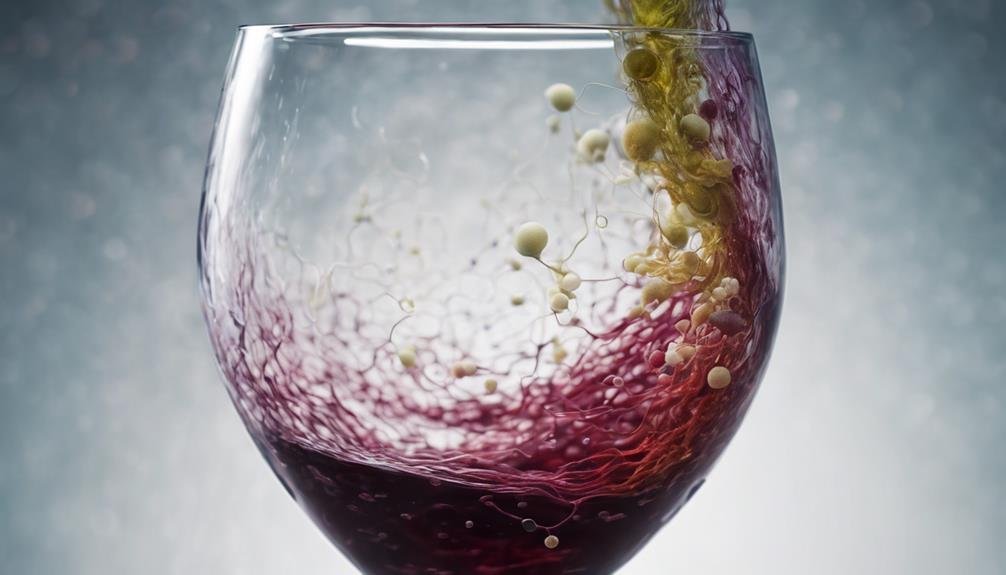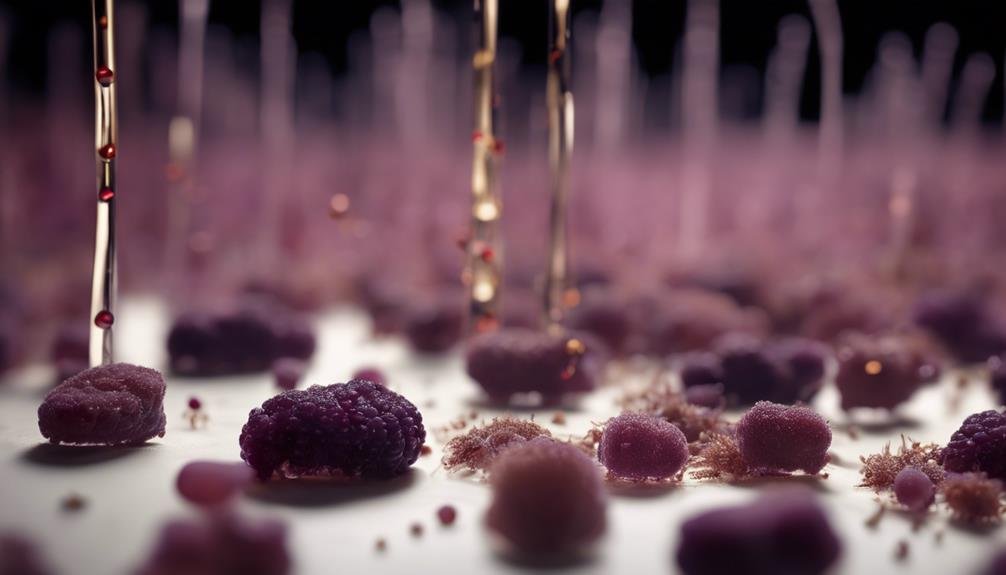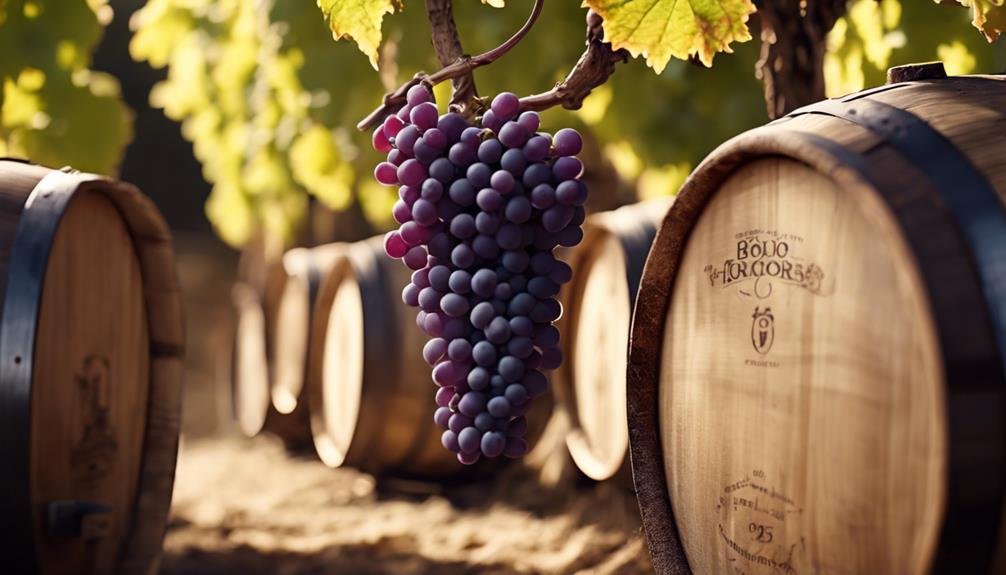Microbes play a vital role in revealing wine's terroir secrets by shaping flavors and aromas. The interplay between microbial communities and grape composition influences wine complexity during fermentation. Bacteria and fungi interacting with grape sugars produce fruity, floral, earthy, or spicy notes in wine. Understanding microbial diversity is essential in showcasing grape and terroir characteristics. Different wine-producing regions have distinct microbial compositions impacting flavors and aromas. Microbial diversity interacts with grapevines, influencing wine sensory profiles beyond just soil composition. The relationship between soil, climate, and grapevine microbiomes contributes to wine diversity. Microbial insights enhance wine characteristics, hinting at the intricate world of wine production.
Microbial Influence on Wine Flavor
In the world of winemaking, the intricate interplay between microbial communities and grape composition greatly shapes the nuanced flavors and aromas of the final product. The flavor complexity of wine is influenced by microbial diversity present during the fermentation process. Various bacteria and fungi interact with the grape sugars and compounds, producing a wide array of flavor-enhancing molecules.
These microbes can contribute fruity, floral, earthy, or spicy notes to the wine, adding layers of complexity that make each bottle unique. Understanding the role of microbial diversity in shaping wine flavors is essential for winemakers seeking to craft exceptional products that showcase the distinct characteristics of their grapes and terroir. By harnessing the power of these microbial communities, winemakers can create wines that truly express the essence of their vineyards.
Uncovering Unique Regional Microbiomes
An exploration of the distinct microbial compositions found in various wine-producing regions sheds light on the essential relationship between microbiomes and the terroir characteristics of wines.
Microbial diversity plays a vital role in shaping the unique flavors and aromas of wines, reflecting the regional influences on grapevines. Different regions exhibit specific microbial communities that interact with the grapes, influencing the fermentation process and ultimately the sensory profile of the wine produced.
Understanding these regional microbiomes provides insights into the complexity of terroir and challenges the traditional notion that soil type is the sole determinant of wine characteristics.
Challenging Traditional Terroir Factors

Contrary to conventional beliefs in the wine industry, the influence of terroir on wine characteristics extends beyond soil composition alone. Soil diversity and climate impact play vital roles in shaping the unique flavors and aromas of wines from different regions.
While soil type has long been considered the primary factor in regional wine variation, recent studies challenge this notion by highlighting the significance of climate and its interaction with soil diversity. The intricate relationship between soil composition, climate conditions, and grapevine microbiomes contributes to the rich diversity of wines found across various terroirs.
Understanding how these factors interplay is essential for appreciating the complexity and depth of wines and unraveling the secrets hidden within their terroir.
Linking Microbes to Wine Characteristics
Exploring the intricate relationship between microbial communities and wine characteristics reveals a deeper understanding of the nuanced flavors and aromas present in different wine varieties. The concept of microbial terroir emphasizes how the diverse microbial populations in vineyards contribute to the distinctiveness of wines. These microbes play a vital role in shaping the flavor dynamics of wines, influencing factors such as acidity, aroma complexity, and mouthfeel. By studying the microbial terroir of different grape varieties, researchers can uncover how specific microbes impact the sensory profile of wines, highlighting the intricate interplay between microbiology and winemaking. Understanding these microbial influences allows winemakers to better control and enhance the unique characteristics of their wines, ultimately leading to a more refined and distinctive drinking experience.
| Microbial Terroir | Flavor Dynamics |
|---|---|
| Unique microbial populations in vineyards | Influence acidity and aroma complexity |
| Impact on wine distinctiveness | Shape mouthfeel characteristics |
| Study of microbial terroir reveals sensory insights | Enhance overall drinking experience |
Implications for Wine Production

Enhancing wine production efficiency through the strategic integration of microbial terroir insights is a pivotal consideration for modern winemaking operations. Understanding the microbial communities present in different vineyard sites can provide valuable information for optimizing fermentation dynamics and enhancing the overall quality of wine production.
By analyzing the bacteria and fungi present in grape must, winemakers can make informed decisions regarding vineyard management practices to cultivate specific microbial populations that positively influence wine characteristics. This knowledge can lead to more precise control over fermentation processes, resulting in wines that better express their unique terroir.
Incorporating microbial terroir insights into vineyard management strategies can ultimately help winemakers produce wines that reflect the distinct flavors and aromas of their specific geographic location.
Frequently Asked Questions
How Do Different Grape Varieties Affect Microbial Communities in Wine Production?
Grape varietal influence on microbial diversity in winemaking is a critical aspect of wine production. Understanding how different grape varieties shape microbial communities is essential for elucidating the intricate link between grape genetics and the final sensory attributes of wine.
Can Microbial Analysis Help Identify Counterfeit Wines Based on Unique Fingerprints?
Microbial analysis can aid in wine authentication by identifying counterfeit wines through unique microbial fingerprints. Understanding microbial diversity enables counterfeit detection by pinpointing inconsistencies in wine composition, contributing to the fight against fraudulent practices in the wine industry.
Are There Any Health Benefits Associated With Specific Microbial Strains Found in Wine?
Probing probiotics within wine, can specific microbial strains fortify gut health or bolster the immune system with antioxidants? Research explores the potential health benefits of wine microbes, shedding light on their potential physiological perks.
How Do Environmental Changes, Such as Climate Change, Impact Wine Microbiomes?
Environmental changes, like climate shifts, impact wine microbiomes by influencing soil composition and microbial diversity. Temperature fluctuations can alter microbial activity, affecting grape characteristics and wine quality. Understanding these dynamics is essential for maintaining wine consistency and quality.
Can Microbial Research Lead to New Winemaking Techniques for Enhanced Flavors?
Exploring yeast diversity and microbial fermentation can revolutionize winemaking. Understanding how microbial fermentation impacts flavor development offers a gateway to innovative techniques enhancing wine profiles. Research in this area holds promise for exciting advancements in the industry.
Conclusion
In the world of wine, microbial communities play a vital role in shaping the unique flavors and characteristics of different varieties. As the saying goes, 'In wine there is truth,' and through understanding the intricate relationship between microbes and terroir, we can reveal the secrets behind the sensory experience of wine.
This research not only enriches our knowledge of winemaking but also offers a deeper appreciation for the complexities that contribute to the diverse world of wine. Cheers to the fascinating world of wine microbiology!
